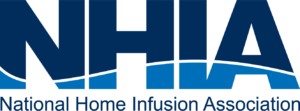Alexandria, Va. (February 24, 2023)—The National Home Infusion Association (NHIA) appreciates the Centers for Medicare and Medicaid services (CMS) publication, “HIT Monitoring Report, February 2023,” which summarizes utilization trends for the Medicare Part B home infusion therapy (HIT) services benefit from 2020 through Q1 and Q2 of 2022. The data supports NHIA’s assessment that the benefit—as currently implemented—continues to flail and lacks sufficient participation from providers to ensure equitable access to beneficiaries across the U.S. This is the second report by CMS illustrating the failure of the Part B HIT services benefit to attract providers.1 Despite numerous comment letters and suggestions from NHIA regarding how to improve the benefit, CMS did not address the structure of the benefit in its most recent rule-making process despite issuing a report with similar findings in 2022.
The report, which examines utilization of the Part B HIT services benefit created by the 21st Century Cures Act passed in 2016 and the temporary transitional payment (TTP) as required by the Bipartisan Budget Act of 2018, finds that utilization remained essentially flat over the 26-month study period despite growing enrollment in Medicare over the same timeframe. On average, only 1,250 beneficiaries are receiving Part B HIT services per quarter, a small fraction of the patients eligible for the service. This lack of improvement is alarming considering that all home infusion patients require some level of nursing support. To fill the gap, patients often need to visit their physician or a local hospital to receive routine services typically done at home.
Minimal provider participation in the benefit is likely the reason for the geographic disparities, which worsened from the previous report. When comparing data maps from the current and previous report, the number of states having no services provided to beneficiaries increased from 3 to 6, including AK, MT, ND, SC, VT, and WY. The gaps in available services, particularly in large rural states, are more pronounced when the individual therapy categories are analyzed. For example, the number of states with no providers billing for Category 3 chemotherapy drugs—the most complex treatments—increased from 18 to 20 states. Additionally, the average number of providers billing for HIT services only grew from 55 to 67 between 2019 and Q2 of 2022, a dismal number considering there are nearly 1,000 DMEPOS pharmacies, 11,000 home health agencies, and a wide range of other providers in the U.S. capable of participating in the benefit.
The lack of provider participation in the Part B HIT services benefit is directly related to CMS’s policies (i.e., lack of payment for professional pharmacy services) and new requirements for providers to obtain accreditation to bill for services. Home infusion pharmacy services, particularly for Category 1 and 3 drugs which are declining in use due to the lack of payment for services, usually require compounding, and are not easily provided from a central location. Ensuring broad access to these specialized services requires having many providers enrolled in every state. And, while the report shows that the number of total visits billed increased, the gains stem almost entirely from a handful of providers increasing the number of visits for patients in Category 1, which includes patients with highly acute, debilitating conditions such as congestive heart failure.
These trends in Medicare contradict the patterns currently playing out in the commercial sector where utilization of home infusion has been growing rapidly. Even before the COVID-19 pandemic which sparked a new wave of growth, the industry experienced a 300% increase in patient volume between 2008 and 2018.2 Commercial plans have eagerly capitalized on the advantages of home infusion which delivers high-quality care at an appropriate cost and consistently produces some of the highest rates of patient satisfaction in health care.3
“Access to home infusion services under the Part B HIT benefit is declining at a time when demand is spiking in other sectors that embrace the pharmacy-driven model. While nursing services are an essential component of home infusion, the pharmacist-driven services to coordinate care, provide compounded sterile drugs, perform clinical monitoring, and ensure patients meet the overall goals of the plan of care are equally important and should be reflected in the benefit,” said Tim Affeldt, PharmD, NHIA Board Chair.
“This new CMS report shows once again that the HIT services benefit is not attracting a sufficient number of providers to serve all eligible Medicare beneficiaries, thus there is an urgent need for Congress to act and pass legislation to correct CMS’s failures. By not accounting for the full range of services, CMS is again ignoring the fact that many of Medicare’s most vulnerable seniors are losing access to home-based IV care,” said Connie Sullivan, BSPharm, NHIA President and CEO.
NHIA is a trade association that represents companies that provide infusion therapy to patients in their homes, as well as companies that manufacture and supply infusion and specialty pharmacy products. Infusion therapy involves patient-specific compounded medications, supplies, and a range of pharmacy, nursing, and other clinical services for delivering care to patients in the home setting. For more information, visit www.nhia.org
###
